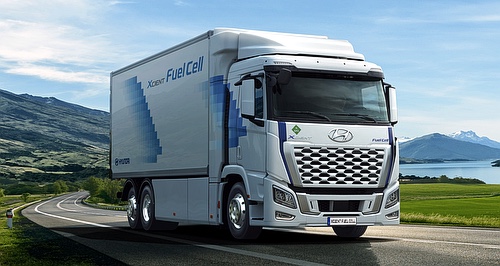News - Hyundai - XcientHyundai Xcient FCEV trucks get to work in GermanyExtensive trial program sees 27 hydrogen-powered rigs take to the road5 Aug 2022 HYUNDAI Motor Company has announced the export of its heavy-duty Xcient fuel cell trucks to Germany for trial.
Seven German companies, across logistics, retail, and manufacturing, will put 27 of the fuel cell Xcient rigs to work, backed by funding for eco-friendly commercial vehicles from Germany’s Federal Ministry for Digital and Transport (BMDV).
BMDW rolled out its funding guidelines for commercial vehicles last year, after approval by the European Commission, with a budget of 1.6 billion euros available up to 2024.
The funding is available for battery, fuel cell, and overhead line hybrid vehicles, for which Hyundai’s Xcient qualified.
Germany is the largest commercial vehicle market in Europe, and this program promotes the use of sustainable drive systems as well as the development of refuelling infrastructure.
Hyundai’s Hydrogen Mobility joint venture with Swiss company H2 Energy, has established Hyundai Hydrogen Mobility Germany GmBH (HHMG) to pursue the hydrogen fuel cell market in Germany.
The HHMG will operate locally in Germany, with sales and customer service on offer, and plans to actively participate in a second funding program.
“We are glad to now also officially enter the German commercial vehicle market with our heavy-duty fuel cell electric truck, the Xcient Fuel Cell,” said Hyundai Motor Company senior vice president and head of commercial vehicle business innovation, Mark Freymueller.
“Hyundai Motor, which is recognised as the leader in hydrogen fuel cell technology, will leverage this opportunity to expand our business into the wider European market by successfully supporting Germany’s efforts to achieve its carbon neutral goals.”
The Xcient trucks in question will be equipped with a 180kW hydrogen fuel cell system comprised of two 90kW fuel cell stacks, sending juice to a 350kW electric motor with a gargantuan 2237Nm of torque.
Driving range offered with the Xcient’s seven hydrogen tanks, storing 31kg of fuel and complemented a 72kWh battery pack, is 400km between top ups.
Refuelling takes between eight and 20 minutes, and that variation is due to the effect of ambient temperature on refuelling.
Hyundai Motor Company first launched the Xcient in 2020, as the world’s first mass-produced hydrogen-electric heavy-duty truck.
Since that time, Hyundai has trialled the trucks extensively in Switzerland, where the fleet has accumulated more than four million working kilometres.
Whether we will see this Xcient model in Australia is unknown at this stage, however local suitability for hydrogen-electric trucks was recently improved when Viva Energy announced plans to build a $43.3-million New Energies Service Station in Geelong, Victoria.
Hyundai Motor Company Australia did, however, launch its Nexo fuel-cell electric vehicle (FCEV) into the ACT and Queensland state governments’ vehicle fleets earlier this year.
Australia does already have hydrogen-vehicle refuelling stations in Brisbane, Canberra, Melbourne, Perth, and Sydney, however they are not available for public use.
Viva Energy says its public use facility will kick-off the development of the ‘new energy’ refuelling network, set to extend to Sydney and Brisbane.
The facility is expected to be operational by 2023 and will be Australia’s first publicly accessible commercial hydrogen refuelling station.
 Read more2nd of March 2022  Viva Energy to build hydrogen station in GeelongAustralia’s first publicly accessible commercial hydrogen refuelling station gets the green light |
Click to shareHyundai articlesResearch Hyundai Motor industry news |
















Facebook Twitter Instagram